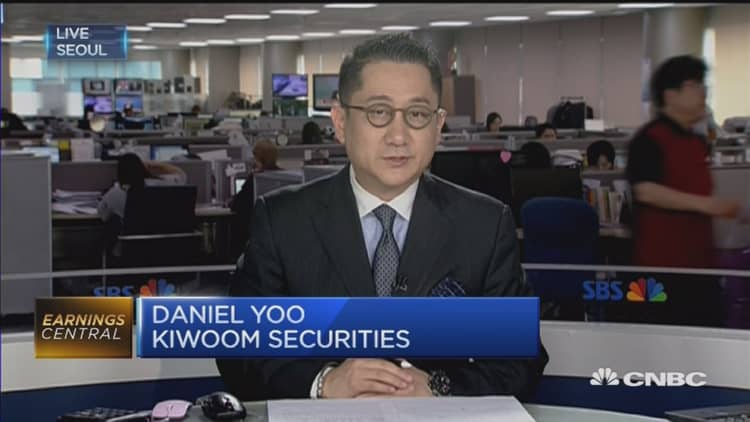Samsung's chip division, which propelled it to record second quarter earnings, could be almost twice the size of Intel's entire business.
The South Korean electronics giant reported operating profit of 8.03 trillion Korean won ($7.21 billion) in its semiconductor division in the three months to June, accounting for more than 57 percent of its entire earnings. Revenues came in at 17.58 trillion Korean won or $15.78 billion.
U.S. rival Intel, which is a semiconductor giant, is set to report second quarter earnings after the market close on Thursday. Analysts surveyed by Reuters are expecting an operating profit of $3.89 billion in the second quarter. If that is realized, Samsung's semiconductor business alone would be almost twice the size of Intel's in terms of operating profit.
Samsung first overtook Intel in the first quarter of 2017 when it reported operating profit in its semiconductor unit of 6.31 trillion Korean won or $5.66 billion, more than Intel's $3.9 billion figure. However, revenues were still slightly behind Intel. But the second quarter is shaping up to be the first time Samsung's operating profit and revenues for its chip division, will surpass those of Intel's whole business.
Focus on chips
The South Korean firm is still the world's largest smartphone player, and its recently-released flagship Galaxy S8 has performed well. But in recent times, it has been investing heavily in the chip business.

Earlier this month it announced plans to invest $18 billion in South Korea in its chip business, as it doubles down on the division.
"Based on its history, we believe Samsung is either entrenching itself in areas where it is a market share leader … or making a push to gain market share," investment bank Stifel said in a research note Thursday.
A number of trends are driving the uptake of so-called NAND and DRAM chips Samsung produces, which can be used in devices such as laptops and smartphones, through to data centers. There is rising demand, but not enough supply, which is pushing prices higher. At the same time, the number of data centers are growing.
Intel has been particularly strong in the data center business. Revenues in its data center group rose 8 percent in 2016 to $17.2 billion. But it is facing threats from Samsung, but also other players such as Nvidia and AMD.
Investment house Jeffries downgraded Intel from hold to underperform earlier this month saying the chipmaker has the "most to lose" in the "4th tectonic shift in computing." The industry shifted from PCs to mobile at first. But now another shift is underway towards the internet of things, meaning loads of devices that are connected to the internet, as well as artificial intelligence.
"As the incumbent with dominant share, we think INTC (Intel) has the most to lose," Jefferies analyst Mark Lipacis wrote in a research note dated July 10.
Intel shares to rally?
Analysts have a mixed view on Intel shares. There are 4 strong buy ratings, 18 buys, 15 holds, 4 sells, and 2 strong sell ratings on the stock. But there does seem to be a growing consensus that feels Intel shares are undervalued, and the market is too bearish.
And the company is also keeping abreast of changes in the semiconductor market. Earlier this month it unveiled a new line of chips aimed at servers and data centers called the Xeon Scalable Line. Intel touted improved performance and already a number of high-end customers are using the product. This was encouraging for some analysts.

"While there are a lot of moving parts within the story, we think that an improving margin structure and continued focus on increasing operational efficiencies, coupled with a renewed focus on non-PC related growth markets will ultimately yield continuing improvement in profitability metrics," MKM Partners said in a note on July 12.
The average price target for Intel's stock, according to analysts surveyed by Reuters, is $39.53, representing roughly 14 percent upside from Wednesday's close. But Intel's stock is down over 4 percent year-to-date.
In contrast, Samsung has seen a 38 percent rally in the same period. The majority of analyst have either a strong buy or buy rating, with just two holds and no sellers. The average price target on the stock is 2,928,529 Korean won, representing 18 percent upside from Thursday's close.





